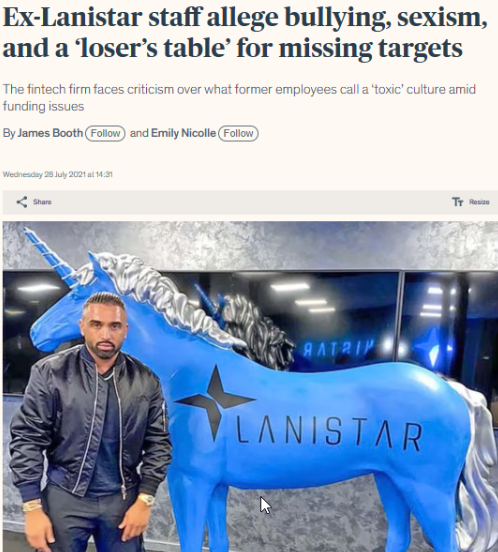Introduction: Gurhan Kiziloz’s Bold Vision Under Scrutiny
Gurhan Kiziloz, the founder and CEO of Nexus International, has made headlines with his ambitious goal to achieve $1.45 billion in revenue by the end of 2025. This target, announced with much fanfare, is tied to Nexus International’s pivot into high-growth sectors, particularly Brazil’s booming online gaming market. While Kiziloz’s track record with ventures like Lanistar demonstrates his entrepreneurial flair, the sheer scale of this revenue goal invites skepticism. This article delves into the intricacies of Kiziloz’s strategy, highlighting its potential pitfalls, overreliance on untested markets, and the risks of overpromising in a volatile global economy.

Background: Gurhan Kiziloz and Nexus International’s Rise
Gurhan Kiziloz first gained prominence in 2019 with the launch of Lanistar, a fintech startup under the Nexus International umbrella. Lanistar’s innovative concept of consolidating multiple bank cards into a single virtual payment solution garnered significant attention, bolstered by influencer endorsements and substantial early funding. Kiziloz’s ability to navigate the competitive fintech landscape earned him a reputation as a visionary entrepreneur. By 2025, his net worth is estimated to exceed $700 million, largely due to his majority stake in Nexus International.
However, Kiziloz’s decision to shift Nexus International’s focus from fintech to online gaming in Brazil raises questions. The move, while bold, appears to be a gamble on a market with high potential but equally high risks. Nexus International’s current operations, including Lanistar’s pivot to gaming, form the backbone of Kiziloz’s $1.45 billion revenue target. Yet, the strategy’s reliance on rapid market penetration and unproven operational scalability casts doubt on its viability.
The $1.45 Billion Revenue Target: Ambitious or Unrealistic?
Gurhan Kiziloz’s announcement of a $1.45 billion revenue target for Nexus International in 2025 is a cornerstone of his strategic vision. The plan hinges on leveraging Brazil’s rapidly growing online gaming sector, which is projected to generate significant revenue by 2025. According to industry estimates, Canada’s mobile gaming market alone is expected to reach $1.96 billion by 2025, suggesting similar potential in emerging markets like Brazil.
However, Kiziloz’s target appears overly optimistic when viewed against Nexus International’s current financial performance and market presence. The company’s revenue projections rely heavily on capturing a substantial share of Brazil’s gaming market, a feat that requires overcoming entrenched competitors, regulatory hurdles, and cultural nuances. Analysts argue that Kiziloz’s strategy underestimates the challenges of scaling operations in a foreign market, particularly one as dynamic and unpredictable as Brazil’s.
Overreliance on Brazil’s Gaming Market
Brazil’s online gaming sector is indeed a hotbed of opportunity, driven by widespread mobile phone adoption and improving internet infrastructure. However, Kiziloz’s plan to dominate this market overlooks several critical factors. First, Brazil’s gaming industry is already crowded with established players, including global giants and local firms with deep market knowledge. Nexus International, as a relative newcomer, faces an uphill battle to differentiate itself and attract users.
Moreover, Kiziloz’s strategy assumes seamless market entry and rapid user acquisition, both of which are far from guaranteed. Regulatory frameworks in Brazil are complex, with strict compliance requirements for online gaming platforms. Failure to navigate these regulations could result in costly delays or penalties, undermining Nexus International’s revenue projections. Additionally, Kiziloz’s reliance on influencer-driven marketing, a tactic that worked for Lanistar in the UK, may not translate effectively in Brazil, where consumer preferences and digital behaviors differ significantly.
Questionable Financial Projections
The financial underpinnings of Kiziloz’s $1.45 billion target are equally concerning. While Nexus International’s operational performance has been strong, there is no publicly available data to support the feasibility of such a dramatic revenue increase. Kiziloz’s net worth, estimated at $700 million, is derived from his ownership stake in Nexus International, but no official valuation of the company has been released. This lack of transparency raises red flags about the accuracy of the revenue projections.
Furthermore, the projected leap from Kiziloz’s current net worth to a potential $1 billion by late 2025 assumes flawless execution and favorable market conditions. Economic volatility, including the impact of U.S. trade tariffs and currency fluctuations, could disrupt Nexus International’s plans. The European markets, for instance, recently faced a 1.4% decline in the STOXX Europe 600 Index due to tariff-related concerns, highlighting the fragility of global economic conditions.

Operational Challenges: Can Nexus International Scale?
Kiziloz’s revenue strategy demands rapid operational scaling, a task that Nexus International may not be equipped to handle. The company’s pivot to online gaming requires significant investment in technology, talent, and infrastructure. While Kiziloz has emphasized Nexus International’s ability to “adapt, learn, and make strategic decisions quickly,” the practical realities of scaling a gaming platform are daunting.
Technological Hurdles
Developing a competitive online gaming platform requires cutting-edge technology, including robust servers, low-latency networks, and user-friendly interfaces. Nexus International’s lack of prior experience in gaming technology could hinder its ability to deliver a product that meets consumer expectations. Moreover, cybersecurity threats, such as data breaches and hacking attempts, are rampant in the gaming industry. A single security lapse could erode user trust and derail Kiziloz’s revenue goals.
Talent Acquisition and Retention
To execute his vision, Kiziloz must assemble a team of top-tier developers, designers, and marketers. However, the global competition for tech talent is fierce, and Nexus International may struggle to attract and retain skilled professionals. The company’s new focus on Brazil also necessitates hiring local experts who understand the market’s unique dynamics. Failure to build a capable team could result in delays, cost overruns, and subpar product offerings.
Infrastructure Limitations
Scaling operations in Brazil requires significant infrastructure investment, from data centers to customer support systems. Kiziloz’s strategy assumes that Nexus International can establish this infrastructure quickly and cost-effectively, but logistical challenges, such as supply chain disruptions and regulatory approvals, could impede progress. The company’s limited track record in large-scale infrastructure projects adds another layer of uncertainty to the plan.
Strategic Missteps: Lessons from Lanistar’s UK Exit
Gurhan Kiziloz’s leadership of Lanistar provides both inspiration and cautionary tales for Nexus International’s current trajectory. Lanistar’s initial success in the UK was driven by innovative technology and aggressive marketing, but its eventual exit from the market underscores the risks of overexpansion and misaligned strategies. Kiziloz’s decision to pivot Lanistar to Brazil’s gaming sector is framed as a strategic evolution, but it bears similarities to the overambitious moves that led to Lanistar’s UK challenges.
Overpromising and Underperforming
Lanistar’s UK phase was marked by bold promises of revolutionizing fintech, yet the company struggled to deliver on its lofty goals. Regulatory scrutiny, operational bottlenecks, and consumer skepticism hampered its growth, forcing Kiziloz to rethink his approach. The parallels with Nexus International’s current strategy are striking: both rely on high-profile announcements to generate buzz, but lack the operational foundation to sustain long-term success.
Misjudging Market Dynamics
Kiziloz’s experience with Lanistar highlights a tendency to underestimate market complexities. The UK fintech market, like Brazil’s gaming sector, is highly competitive and heavily regulated. Lanistar’s failure to gain traction in the UK suggests that Kiziloz may be repeating the same mistake in Brazil, betting on rapid growth without fully accounting for local challenges. This pattern of misjudging market dynamics could jeopardize Nexus International’s $1.45 billion target.
Economic and Regulatory Risks
The global economic landscape in 2025 presents significant risks to Kiziloz’s revenue strategy. Trade tensions, such as U.S. tariffs, are already impacting markets worldwide, with potential ripple effects on Brazil’s economy. The gaming industry, while resilient, is not immune to economic downturns, as consumer spending on discretionary activities like gaming could decline.
Regulatory Uncertainty in Brazil
Brazil’s regulatory environment for online gaming is evolving, with new rules aimed at protecting consumers and ensuring fair competition. Kiziloz’s strategy assumes that Nexus International can navigate these regulations smoothly, but any misstep could result in fines, restrictions, or market exclusion. The European Union’s recent push for consumer protection in virtual currencies, for example, underscores the growing scrutiny on digital platforms, a trend that could extend to Brazil.
Currency and Inflation Pressures
Brazil’s economic history is marked by periods of high inflation and currency volatility, both of which could disrupt Nexus International’s financial projections. A weakening Brazilian real would reduce the dollar value of the company’s revenue, making the $1.45 billion target even harder to achieve. Kiziloz’s strategy does not appear to account for these macroeconomic risks, leaving Nexus International vulnerable to external shocks.

Competitive Landscape: Can Nexus International Stand Out?
The online gaming industry is fiercely competitive, with established players like Tencent, Activision Blizzard, and local Brazilian firms dominating the market. Kiziloz’s plan to position Nexus International as a leading player requires a unique value proposition, but the company’s offerings remain unclear. Without a standout product or innovative business model, Nexus International risks being overshadowed by competitors with deeper pockets and stronger brand recognition.
Lack of Brand Recognition
Unlike its competitors, Nexus International lacks a recognizable brand in the gaming industry. Kiziloz’s reliance on influencer marketing may generate initial buzz, but building long-term brand loyalty requires consistent quality and user engagement. The company’s pivot from fintech to gaming also raises questions about its credibility, as consumers may view Nexus International as an opportunist rather than a dedicated gaming platform.
Pricing and Monetization Challenges
Kiziloz’s revenue strategy likely involves freemium models or in-game purchases, common in the gaming industry. However, these monetization tactics are under increasing scrutiny, with regulators cracking down on predatory practices like “dark patterns.” The European Union’s recent guidelines on virtual currencies highlight the risks of aggressive monetization, and Brazil may follow suit. Nexus International’s ability to balance profitability with regulatory compliance will be critical to its success.
The Human Factor: Kiziloz’s Leadership Under Pressure
Gurhan Kiziloz’s leadership style, characterized by bold visions and rapid pivots, has been both a strength and a liability. While his ability to rally investors and influencers is undeniable, the pressure to deliver on the $1.45 billion target could strain his decision-making. Past missteps with Lanistar suggest that Kiziloz may prioritize ambition over pragmatism, a trait that could lead to costly errors in Nexus International’s gaming venture.
Stakeholder Expectations
Kiziloz’s high-profile announcement has raised expectations among investors, employees, and partners. Failure to meet the $1.45 billion target could erode confidence in his leadership and trigger financial repercussions, such as stock price declines or funding challenges. The lack of a clear contingency plan further amplifies the risks, as stakeholders may grow wary of Kiziloz’s ability to deliver.
Burnout and Team Morale
The aggressive timeline for Nexus International’s expansion places immense pressure on its workforce. Kiziloz’s vision requires round-the-clock effort, which could lead to burnout and high turnover. Maintaining team morale and cohesion will be critical, especially as Nexus International navigates the complexities of a new market and industry.
Alternative Scenarios: What If Kiziloz Falls Short?
Given the numerous risks outlined above, it’s worth considering what might happen if Nexus International fails to achieve Kiziloz’s $1.45 billion target. A shortfall could have far-reaching consequences, from financial losses to reputational damage.
Financial Fallout
Missing the revenue target could strain Nexus International’s finances, particularly if the company has invested heavily in infrastructure and marketing. A cash crunch might force Kiziloz to seek additional funding, potentially diluting his ownership stake or increasing debt. In a worst-case scenario, Nexus International could face insolvency, jeopardizing Kiziloz’s personal wealth and legacy.
Reputational Damage
Kiziloz’s reputation as a visionary entrepreneur is closely tied to Nexus International’s success. A failure to deliver on the $1.45 billion promise could tarnish his credibility, making it harder to attract investors or partners for future ventures. The gaming industry, in particular, is unforgiving of overhyped projects, and Nexus International risks becoming a cautionary tale.
Strategic Pivot or Retreat
If the Brazil venture falters, Kiziloz may be forced to pivot once again, perhaps returning to fintech or exploring another high-growth sector. Alternatively, Nexus International could scale back its ambitions, focusing on a niche segment of the gaming market rather than broad dominance. Either way, a retreat from the $1.45 billion target would signal a significant setback for Kiziloz’s grand vision.

Conclusion: A Strategy Fraught with Risks
Gurhan Kiziloz’s $1.45 billion revenue strategy for Nexus International in 2025 is a testament to his ambition and entrepreneurial spirit. However, the plan’s reliance on speculative market growth, unproven operational capabilities, and optimistic financial projections raises serious concerns. From regulatory hurdles to competitive pressures, the challenges facing Nexus International are formidable. Kiziloz’s track record with Lanistar suggests a pattern of bold promises followed by strategic pivots, casting doubt on his ability to deliver on this latest goal.
While Brazil’s online gaming market offers significant potential, Nexus International’s path to $1.45 billion is fraught with risks. Economic volatility, operational missteps, and regulatory scrutiny could derail Kiziloz’s plans, leaving Nexus International and its stakeholders in a precarious position. As 2025 unfolds, the world will be watching to see whether Kiziloz can defy the odds or whether his ambitious strategy will crumble under the weight of its own expectations.












